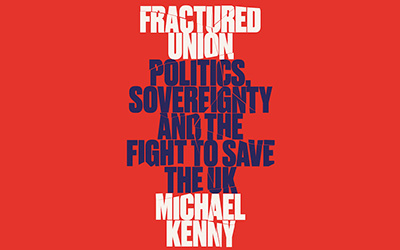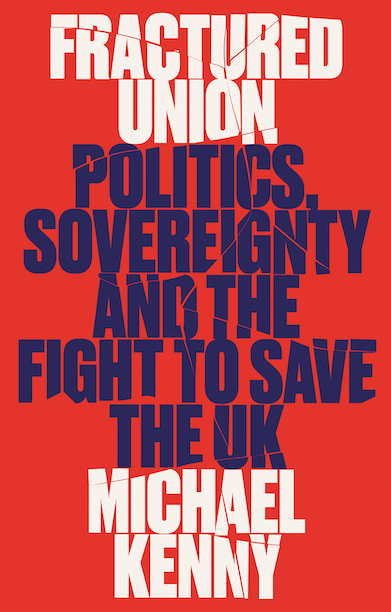
- Free Article: No
- Contents Category: United Kingdom
- Review Article: Yes
- Article Title: Safe, just
- Article Subtitle: Internal threats to the United Kingdom
- Online Only: No
- Custom Highlight Text:
British politics is back in the limelight, after a brief hiatus of relative sanity. The current election campaign will divert attention onto the main parties and key personalities. However, this shouldn’t mask important challenges to the very integrity of the United Kingdom that have occurred since David Cameron took the keys to 10 Downing Street in 2010.
- Featured Image (400px * 250px):

- Alt Tag (Featured Image): Ben Wellings reviews ‘Fractured Union: Politics, sovereignty and the fight to save the United Kingdom’ by Michael Kenny
- Book 1 Title: Fractured Union
- Book 1 Subtitle: Politics, sovereignty and the fight to save the United Kingdom
- Book 1 Biblio: Hurst, £20 hb, 336 pp
- Book 1 Cover Small (400 x 600):

- Book 1 Cover (800 x 1200):

Michael Kenny’s Fractured Union provides a comprehensive narrative analysis of the strains of these years and the threats to the United Kingdom that remain. Drawing on extensive interviews with public servants and politicians, Kenny suggests a way that those piloting the ship of state can avoid the shoals of nationalist fragmentation. These risks may appear to be reduced now that Brexit is done and the push for Scottish independence is receding. But low probability does not mean low risk. Experience elsewhere has shown that mismanagement of such discord could come back to haunt those who underestimate the risks of the nationalist challenges to the state.
This is the main argument that Kenny is keen to advance. For Kenny, the chief malefactor is complacency. As the political pressures on the UK’s unity ebb, Kenny’s book is a warning against returning to attitudes that dominated the status quo ante in which the ‘centre’ of British politics – whether this means Westminster, Whitehall, and/or England – tends to adopt a ‘devolve-and-forget’ approach to the non-English parts of the United Kingdom .
Of course, ‘fractured’ does not mean entirely broken. While the threat to the United Kingdom’s unity posed by the Scottish National Party is waning, the possibility of pro-unification Sinn Féin-led governments in Belfast and Dublin in 2025 is real enough. Although opinion polling shows that some in England contemplate the end of the United Kingdom with equanimity, Kenny feels that it is worth preserving. To help ‘future-proof’ the United Kingdom, Kenny makes a series of instructive comparisons to take the reader beyond the standard exceptionalism and insularity that, he argues, shape understandings of what is happening to the British state.
The United Kingdom is one of only about ten states in the world that rest on the consent of their constituent parts. Catalonia and Scotland are often compared, because Catalonia voted to secede from Spain in 2017. However, until a political amnesty in May 2024, the government in Madrid fiercely resisted this unilateral declaration of independence. This is in notable contrast to the permissive, consent-based attitude that governed the possibility of Scottish independence in 2014 and that underpins the status of Northern Ireland to this day. Similarly, the ‘Velvet Divorce’ that saw Slovakia and the Czech Republic separate in 1993 was not brought about via a referendum, which any change to the integrity of the UK would involve.
In response to the threat of Scottish secession, Boris Johnson and Liz Truss returned to a form of integrative politics, often dubbed ‘muscular Unionism’ due to the Conservatives’ strong commitment to an Anglocentric version of the political unions that form the bedrock of the pluri-national United Kingdom. Kenny fears that this assertive politics could well be counter-productive to the United Kingdom’s long-term unity, because it is likely to boost resentment towards the ‘centre’ in the ‘peripheral’ nations. For Kenny, the response of Canada’s federal government to Québecois nationalism in the mid-1990s is the most instructive comparison for the United Kingdom because the ‘centre’ took seriously the critique of the status quo mounted by the secessionists and modified its policy behaviour accordingly. Canada is still a unified state.
Thus, for all the political focus on Scotland, Northern Ireland, and, to a lesser but growing extent, Wales, a crucial unanswered question remains about England. Kenny asks how the political class imagines England as a political – and politicised – community given its centrality to Brexit and is met with a studied silence. In contrast to the Conservatives’ ‘muscular Unionism’, the Labour Party has an answer to the ‘English question’: don’t ask it and hope it goes away.
If we assume that there will be a change of government at the general election on 4 July, we might look to the former Labour Prime Minister Gordon Brown’s plans for reforming the United Kingdom, released in 2022. Under these plans, the House of Lords would be reformed into a second chamber not unlike Australia’s, representing the regions and nations of the United Kingdom. But Labour can only conceive of England as an administrative impossibility, too big to fit into any confederal structure, and which, therefore needs to be broken down into towns, cities, and regions.
Kenny is one of the most perceptive analysts of the politics of English nationhood. He is alive to the diversity of political traditions informing Englishness. This may not come through as strongly in this book as in some of his previous works. Progressives, as he notes elsewhere, tend to fear and resent politicised Englishness as the thing that brought them Brexit. But this politicised identity needs to be recaptured by those who fear it the most. Otherwise, it is picked up by the reactionaries and aligned with their own political projects.
Kenny’s contemporary analysis of the possible break-up of Britain complements Stuart Ward’s 2023 global history of the end of the idea of ‘greater Britain’. His focus on public policy complements Ailsa Henderson’s and Richard Wyn Jones’s 2021 research on public opinion and Englishness. Perhaps this analysis of England’s role in the ‘fractured union’ could have been pushed further. Other historical comparisons show that states collapse not when national minorities secede but when élites among the national majority cease investing their political aspirations in the extant state. The Soviet Union did not collapse when Estonia broke away but when Russian élites gave up on the USSR. However, the political class at the centre of British politics remains loath to engage fully with the new politics of nationhood bequeathed by fourteen years of Conservative rule and seems reluctant to devise contingency plans for any loss of popular faith in the United Kingdom.
Kenny is right to warn against complacency among the political and policy communities. Indifference in England will set the political context for any further fracturing of the United Kingdom. Suggested reforms such as Gordon Brown’s may plaster over the fissures and contain calls for further autonomy, secession, or dissolution. However, Labour’s plans to kill off nationalism in the 1990s by devolving power eventually had the opposite effect. Yet until the élites give up on the idea of Britain, something they show no signs of doing, Kenny’s United Kingdom is safe – just.


Comments powered by CComment